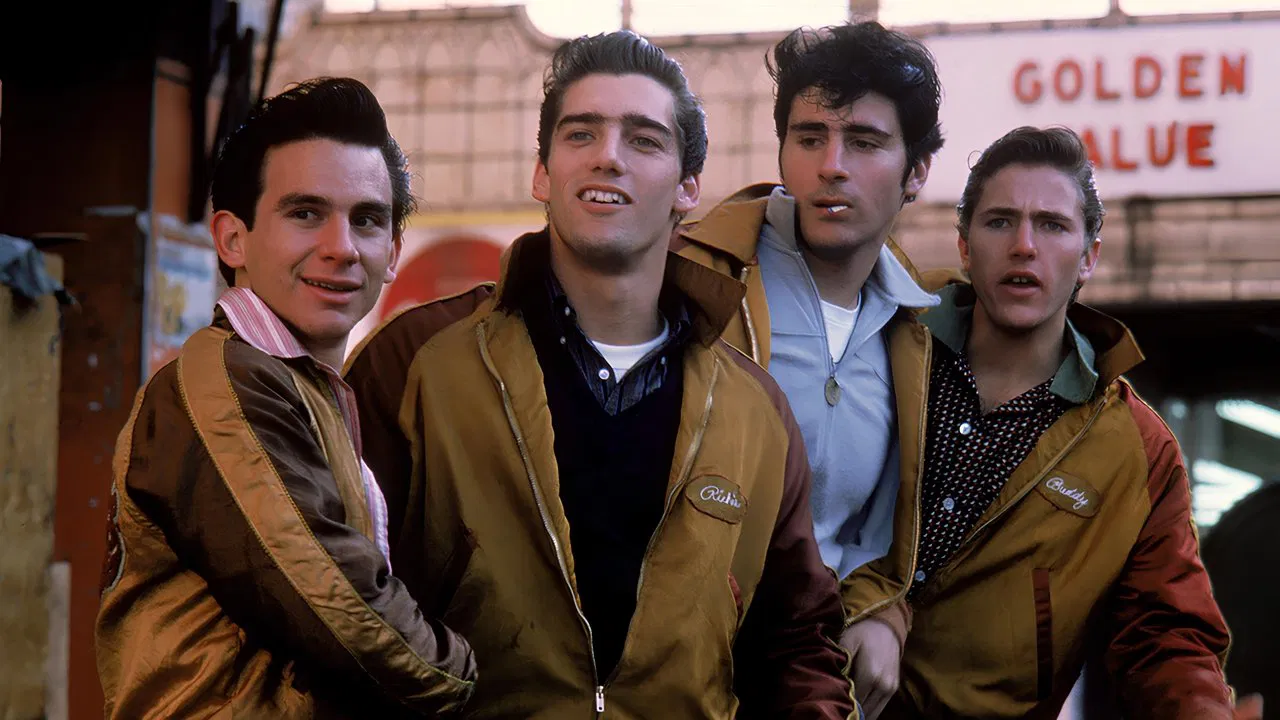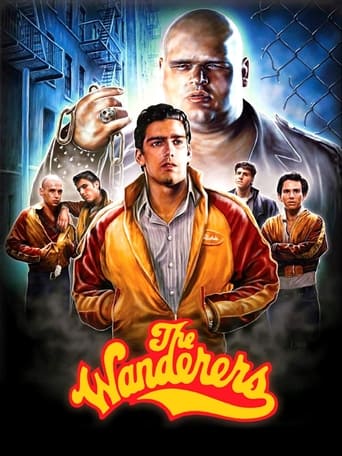

Liked the film to a certain point, but really wish Hollywood would change the generic narrative. Italian & Black gangs are basically decent guys, Chinese gangs are fearsome for using Kung FU. Whilst all White gangs are vicious ignorant brutes, get real. All gangs are Clanish, which is worse than racist, our Scottish gangs have been fighting each other for centuries. If you ignore the obvious stereotyping of White gangs you can enjoy this film if only for the soundtrack itself.
... View MoreI see this movie as a introduction in gang world and also i see this as a beginning of whole gang subculture thing. Each bigger city (even mine) has a gangs which are divided by block. So basically each block has its own gang. What characterize them in this move is race and origin, like Italian have their own gang (The Wanderers), Irish have their own gang and so on. They are, usually, made out of rebellious teenagers and people in their early 20's that only want adventure.Anyway, this movie has a point and lesson (like green street hooligans had too) which many people witnessed on their own skin. In tough situations where you have nothing you have your friends you can relay on. Your whole brotherhood that will be there for you as you will be there for them, you are like a family. THAT is something you cannot be taught in school, that is not something you can find in books, that is life's school. You learn to respect people, to not judge them so easily and to connect to other.
... View MoreI have watched this movie at least 50 times. It is my all time favorite movie. I just mailed my DVD copy (I have VHS also)last week to friends in Santa Barbara. I spoke to them this afternoon and they told me they loved it. My friends wife adores Ken Wahl. When The Wanderers was first released I went to every movie house and Drive-In it was playing at and took a different friend each time. The only person that didn't like this movie was my wife at the time. I even have the soundtrack on 8-track tape. A few songs in the movie were not on the released soundtrack, ie, I Love You by the Volumes. I have also read the book written by Richard Price who appears in the movie as one of the bowling sharks, the one with the mustache. The book is a very good read but does not follow very close to the movie.
... View MorePhilip Kaufman's "The Wanderers" opens with a couple kissing on a couch. He wants to have sex, but she doesn't. "You're a guy," she says, worried about getting pregnant. "Guy's don't have to worry about their reputations!"Kaufman undermines her proclamation by immediately cutting to a shot of skinhead gang members gathering on a street corner, "Walk Like A Man" playing on the soundtrack. As the film progresses, Kaufman will use this scene (a horde of gangsters standing outside a military recruiting station, trying to recruit new members of their own) as a jumping off point to delve into such issues as loyalty, sex, racial tension, adolescent swagger and the pros and cons of machismo. In other words, the film is about guy's worrying about their status and reputations within their own little communities.More importantly, though, Kaufman takes this theme (male identity under threat) and then builds a sequel to his earlier picture, "Invasion of The Body Snatchers", creating a film which is more about migration, movements and group formation.The film's two main protagonists are Richie, leader of a gang called the Wanderers, and Joey, a kid with artistic aspirations. As the film unfolds, we watch as the various boys and men of the picture form cliques, join gangs and jump from one group to the next, always seeking the solace and protection that these ready made support-groups offer. All these gangs assemble at the end of the film, where they face off on a giant football field. The blacks, the Italians, the Chinese, the mafia, the sons, the fathers, all gather on the field, all in their own little testosterone filled groups, waiting for any excuse to release their rage. When that violent moment comes, however, they target not one another, but a ghostly group of men called "The Duckies", a seemingly phantasmic gang which Kaufman bathes in smoke and treats as a kind of supernatural force; even oppositional groups join forces to curb anxieties.After this multi-gang orgy, in which every creed and race teams up to defeat the spectral "Duckies", Kaufman undercuts the testosterone and exposes the normalcy of gang life. Scoring sex leads to dull marriages, acting tough leads to dead end jobs in the military, violence and machismo masks weakness and anxieties, gang peer pressure leads to death etc etc. By the film's end, everyone – despite their macho rebellion - is trapped in a future that's a conformist, carbon copy of the past. All except Joey, the artist who – like the artist character at the end of George Lucas' similar film, "American Graffiti" – jumps in a car and skips town. Don Siegel's 1956 film, "The Invasion of The Body Snatchers", dealt with a hostile group of aliens who sought to take over a small Californian town. The film used a "cultural invasion" from outer space to symbolise the annihilation of free personality in contemporary society.Kaufman's 1978 remake, however, saw "cultural invasion" as a blend of what sociologist Robert Park calls "migrations" and "passive movements". Migration as a mass movement usually entails a certain amount of cultural conquest (economic or political) and assimilation, whereas passive movements represent a more individualised negotiation of cultural boundaries within a society (in Kaufman's invasion film, the humans have to act like aliens who are themselves acting like humans, in order to survive. IE, conformity is itself a kind of parody of a fake humanity). In Don Siegel's film, actor Kevin McCarthy stumbles out onto a rural street and yells "They're here!", warning townsfolk of the alien invasion. In Kauffman's remake, the same Kevin McCarthy finds himself bumbling down a busy urban street, again yelling "They're here!"The relocation of the alien invasion from rural town to urban mega-city marks an important shift. By placing the alien invasion within a metropolitan centre the sharp distinctions between ethnic groups (blacks, Irish, Italian, Japanese, American, Commie etc) are down played while the question of the individual as Other within the large, alienating convolutions of the modern landscape takes precedence. In the modern world, individuality as a means of defining oneself against any number of groups becomes lost within the ubiquitous streamlining of social, ethnic, and religious differences, everyone essentially becoming the same in their differences.In Kaufman's next film, "The Wanderers", he again has a character yelling "They're here!", this time when the virus-like "Duckies" appear. Set against the changing nature of ethnic communities within the Bronx, the racial tensions of the film are resolved not by all the different races battling against one another in order to survive, but in the races "coming together" against an external, seemingly ghostly contaminant. Here it is conformity – the very alien behaviour that the humans rallied against in "Body Snatchers" – that allows the various gangs to band together and fight off the foreign invaders.Kauffman stresses that it is the basic values that the different gangs share (codes, morals, symbols, colours, lack of weapons etc), that allow them to identify with one another and band against the invading "Duckies". The "Duckies" themselves are perhaps a stand in for America's Vietnamese or foreign enemies, which Kaufman sees as a ghostly sham, a boogie man used to whip up home-grown fear.Why are the gangs so easily whipped up into fear? Because they all agree on boundaries to define themselves in relationship to other ethnic/racial groups. "The Duckies", however, refuse to acknowledge these basic values. They, like the aliens from "Body Snatchers", are an external social force that does not distinguish between race, ethnicity and religion, and are therefore threatening to the supposedly "distinct" and "anti establishment" (ie hypocritical) gangs, solely because of their non conformity.8.5/10 – Kaufman's use of surfing music predates "Pulp Fiction". Worth two viewings.
... View More